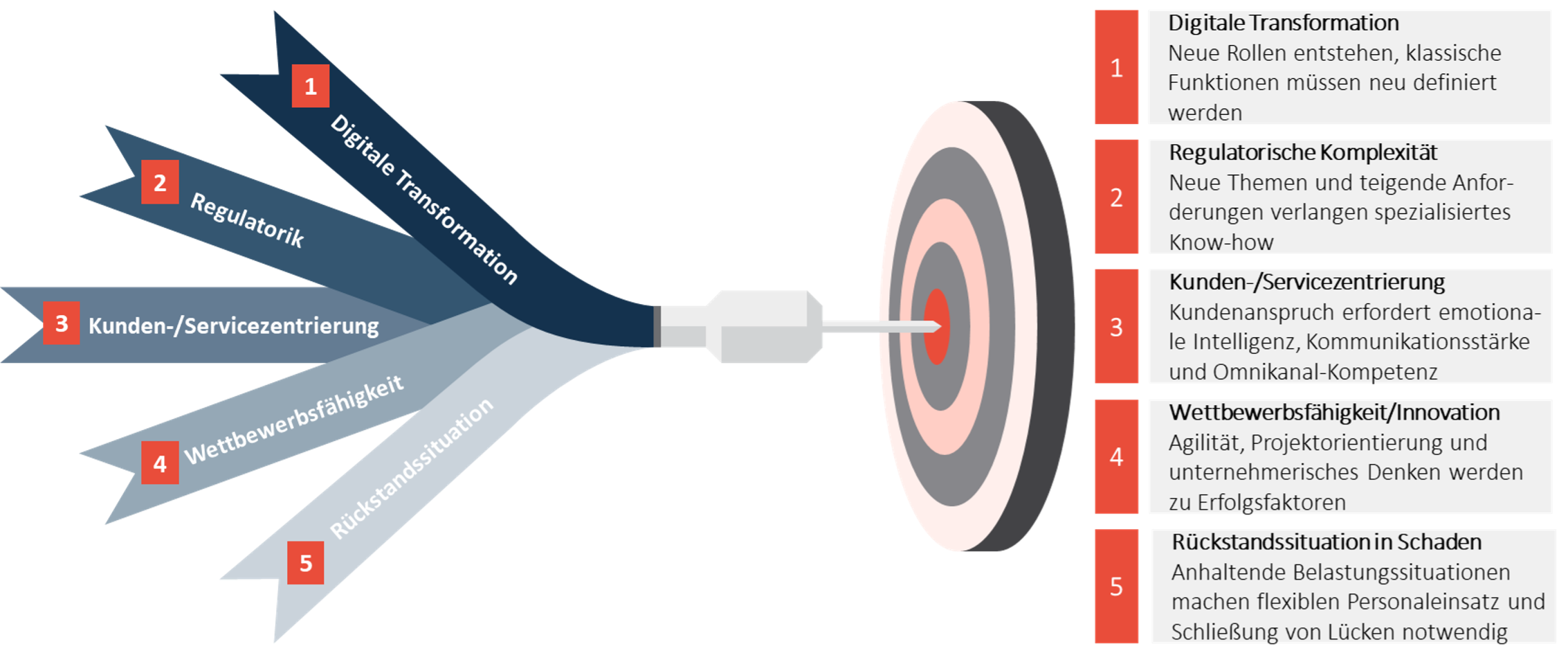
Strategic personnel planning in the insurance industry

Strategic HR planning in the insurance industry - a key lever for securing the future in times of upheaval.
The insurance industry is undergoing a profound transformation process: digitalization, changing customer behaviour, regulatory dynamics and an increasing shortage of skilled workers are presenting companies with strategic challenges. Forward-looking, data-supported HR planning is therefore becoming a critical success factor. It ensures the targeted development of future-relevant skills, minimizes capacity risks and combines business objectives with the requirements of a dynamic labour market.
Business requirements are the starting point for personnel planning
Strategic HR planning must not be a methodical finger exercise for the people departments; it must be geared towards the needs of the business - if these are not clear, they must be jointly defined. Typically, we are currently observing five drivers with particular relevance for strategic HR planning.

Digital transformation
Automated processes, AI-based decision support, self-service portals and new customer interactions are transforming the business model. New roles are emerging (e.g. data scientists, cloud engineers, UX specialists), while traditional functions need to be redefined. HR planning must anticipate the need for digital skills at an early stage - and actively shape them.
Regulatory complexity
The insurance industry is heavily regulated - requirements for data protection, solvency, money laundering prevention, sustainability reporting and cyber security are constantly increasing. These regulations have a direct impact on tasks and qualification profiles in areas such as compliance, legal, controlling and underwriting. Strategic personnel planning must ensure that sufficient qualified personnel are available at all times in order to implement regulatory requirements efficiently and in a legally compliant manner.
Kundenzentrierung & Serviceorientierung
Today's customers expect fast, personalized services - across all channels and in real time. This results in requirements for emotional intelligence, strong communication skills and omnichannel expertise. HR planning must specifically promote and anchor these skills.
Competitiveness & innovative strength
The insurance market is highly competitive, with growing pressure from InsurTechs, competitors from outside the industry and platform providers. Companies need to become more agile and innovative. This requires a personnel structure that can react flexibly to market changes - with project-oriented teams, interdisciplinary skills and a pronounced willingness to change. Planning must focus on an adaptive, interdisciplinary personnel structure that supports innovation and actively shapes change.
Backlog situations in claims processing
Storms, pandemics or system failures regularly lead to peak loads. If there are insufficient personnel resources or options for flexible redistribution, processing backlogs arise. This leads to frustration among customers and damages trust in the insurer. Strategic personnel planning must therefore also take into account short-term escalation scenarios - for example, by using standby pools, external resources or automated workflows to cushion peaks.
Our methodical approach - holistic and proven in practice
1. strategic derivation of personnel requirements
The starting point is the systematic linking of business strategy and personnel planning. Changes in the product portfolio, technological progress or new customer expectations lead to changes in skills requirements. A well-founded labor market analysis helps to realistically assess external trends and availability.
2. scenario-based personnel requirements planning
Quantitative and qualitative methods are used to determine which roles, skills and capacities will be required in the future. Scenarios - for example on market development, technological penetration or regulatory changes - make it possible to set up robust and flexible planning models.
3. inventory analysis and simulation
The current workforce is recorded in detail: Qualifications, age structure, fluctuation, development potential, deployment flexibility and remuneration data are integrated and extrapolated. Critical roles are identified in order to make bottlenecks and surpluses visible at an early stage.
4. target/actual comparison & risk analysis
A structured comparison reveals areas for action: Where are there gaps? Where are there capacity risks? Where are there overstaffing or a need for retraining? The results are incorporated into a transparent capacity and risk management system.
5. development of measures - targeted and networked
Measures are derived on the basis of the fields of action identified - from recruiting and training initiatives to succession planning. Close integration with the corporate strategy and consideration of industry-specific challenges are crucial.
6. monitoring & control
Ongoing controlling of measures ensures responsiveness. Changes in the market, technology or regulation can thus be adapted at an early stage - supported by suitable KPIs and digital dashboards.
Implementation challenges - and how we solve them
- Forecast uncertainty: The future cannot be planned - but it can be prepared for. Our scenario approaches help to systematically deal with uncertainty.
- Skills shortage: We use our market knowledge to identify opportunities in recruiting, training and location strategy.
- Resistance within the company: We provide holistic support for change - with tried-and-tested change management and targeted communication.
- Data fragmentation: We create transparency through the integrated use of data - from HR systems and key financial figures to strategic management.
A holistic solution requires excellent methodological expertise, in-depth market knowledge and strategic intuition - this is where Horn & Company comes in.
Our support - your added value
Horn & Company supports insurance companies in the introduction and further development of strategic HR planning - with industry expertise, analytical precision and strong implementation skills.
Our expertise at a glance:
Market knowledge: In-depth understanding of industry-specific trends, regulatory requirements and competitive dynamics.
Professionalism: Combination of HR excellence, digital transformation and insurance-specific expertise.
Analytical skills: Application of the latest methods of scenario planning, simulation and data-based management - from forecasting to KPI-supported monitoring.
Implementation expertise: Design and implementation of pragmatic, measurable packages of measures - integrated into your strategic management.
Shaping the future instead of reacting
Strategic HR planning is not an isolated HR issue, but a central control mechanism for corporate development. Those who build up skills at an early stage, react flexibly to changes and manage personnel requirements with foresight will secure their long-term competitiveness.
Ready to take the next step?
Whether initial thoughts or concrete plans - we listen, ask questions and develop further together. In a non-binding initial consultation, we will clarify where you stand and how we can support you.



